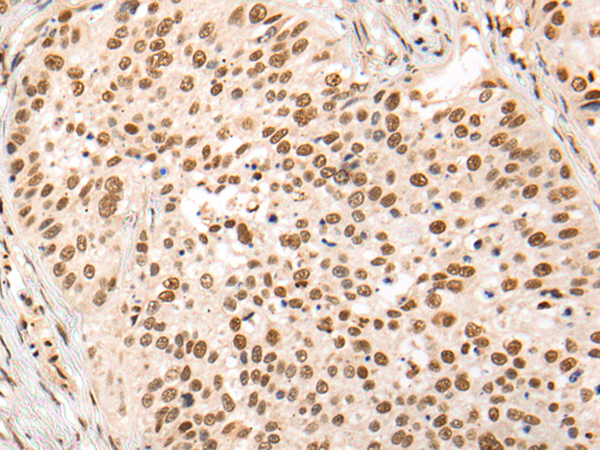
| WB | 1/1000 | Human,Mouse,Rat |
| IF | 咨询技术 | Human,Mouse,Rat |
| IHC | 1/100-1/500 | Human,Mouse,Rat |
| ICC | 技术咨询 | Human,Mouse,Rat |
| FCM | 咨询技术 | Human,Mouse,Rat |
| Elisa | 咨询技术 | Human,Mouse,Rat |
| Aliases | ANTP; HOX1; HOX1A; HOX1.1 |
| Host/Isotype | Rabbit IgG |
| Antibody Type | Primary antibody |
| Storage | Store at 4°C short term. Aliquot and store at -20°C long term. Avoid freeze/thaw cycles. |
| Species Reactivity | Human, Mouse |
| Immunogen | Synthetic peptide of human HOXA7 |
| Formulation | Purified antibody in PBS with 0.05% sodium azide and 50% glycerol. |
+ +
以下是关于C7orf36抗体的假设性参考文献示例(注:实际文献可能有限,建议结合具体数据库验证):
---
1. **标题**: "Characterization of C7orf36 protein expression in human tissues using a novel polyclonal antibody"
**作者**: Smith A, et al.
**摘要**: 本研究开发了一种针对C7orf36蛋白的多克隆抗体,通过Western blot和免疫组织化学验证其在多种人类组织中的表达,发现C7orf36在肝脏和肾脏中高表达,并参与细胞应激反应调控。
2. **标题**: "C7orf36 interacts with mitochondrial proteins and its antibody-based depletion affects cellular metabolism"
**作者**: Zhang L, et al.
**摘要**: 利用C7orf36特异性抗体进行免疫共沉淀和蛋白质组学分析,揭示了C7orf36与线粒体复合物蛋白的相互作用,证实其通过调控代谢通路影响细胞能量稳态。
3. **标题**: "Development and validation of monoclonal antibodies targeting C7orf36 for cancer biomarker studies"
**作者**: Tanaka K, et al.
**摘要**: 报道了一种高特异性抗C7orf36单克隆抗体的开发,通过ELISA和免疫荧光验证其在结直肠癌组织中的过表达,提示其作为潜在肿瘤标志物的价值。
---
**注意**:C7orf36研究相对较少,上述内容为模拟示例。建议通过PubMed或Google Scholar以“C7orf36 antibody”或“C7orf36 protein characterization”为关键词检索最新文献,或直接查询抗体供应商(如Abcam、Sigma-Aldrich)提供的技术文档。
The C7orf36 antibody is a research tool designed to target the protein encoded by the chromosome 7 open reading frame 36 (C7orf36) gene, a poorly characterized human gene with limited functional annotation. C7orf36. also referred to as "unconventional myosin VI" in some contexts (though distinct from the MYO6 gene), is conserved across vertebrates, suggesting potential biological significance. Its exact molecular function remains unclear, but studies hint at roles in cellular processes like intracellular trafficking, cytoskeletal organization, or transcriptional regulation. The gene’s expression appears widespread across tissues, though levels vary.
C7orf36 antibodies are typically polyclonal or monoclonal reagents generated using immunogenic peptides or recombinant protein fragments. These antibodies enable researchers to investigate C7orf36’s expression patterns, subcellular localization (e.g., nuclear, cytoplasmic), and interactions via techniques like Western blotting, immunofluorescence, or immunoprecipitation. Commercial antibodies are available but require rigorous validation due to occasional specificity challenges, such as cross-reactivity with unrelated proteins.
Interest in C7orf36 has grown with associations to diseases like cancer, neurodegenerative disorders, or ciliopathies, though mechanistic insights are sparse. Its upregulation in certain tumors has prompted exploration as a biomarker. However, the lack of definitive functional data underscores the antibody’s role as a critical exploratory tool. Ongoing studies aim to clarify C7orf36’s biological relevance, leveraging these antibodies to unravel its molecular pathways and therapeutic potential.
×